Company Law Assignment: Shareholder Rights and Issuance
VerifiedAdded on 2020/03/13
|5
|1249
|52
Homework Assignment
AI Summary
This assignment analyzes three key issues in company law. Part A examines whether Grand Ltd. can issue new preference shares, considering the impact on existing shareholders' rights and the need for a special resolution. Part B investigates if the company can divide ordinary shares into Class A and Class B, focusing on the potential alteration of shareholder rights and the requirement for unanimous consent or court intervention. Part C assesses the possibility of issuing new Class B shares to a new investor, considering the impact on existing shareholders, particularly the Audax family, and the need for shareholder approval. The analysis references the Corporations Act 2001 and relevant case law, concluding that the proposed actions may face legal challenges due to the potential infringement of shareholder rights and the lack of necessary approvals.
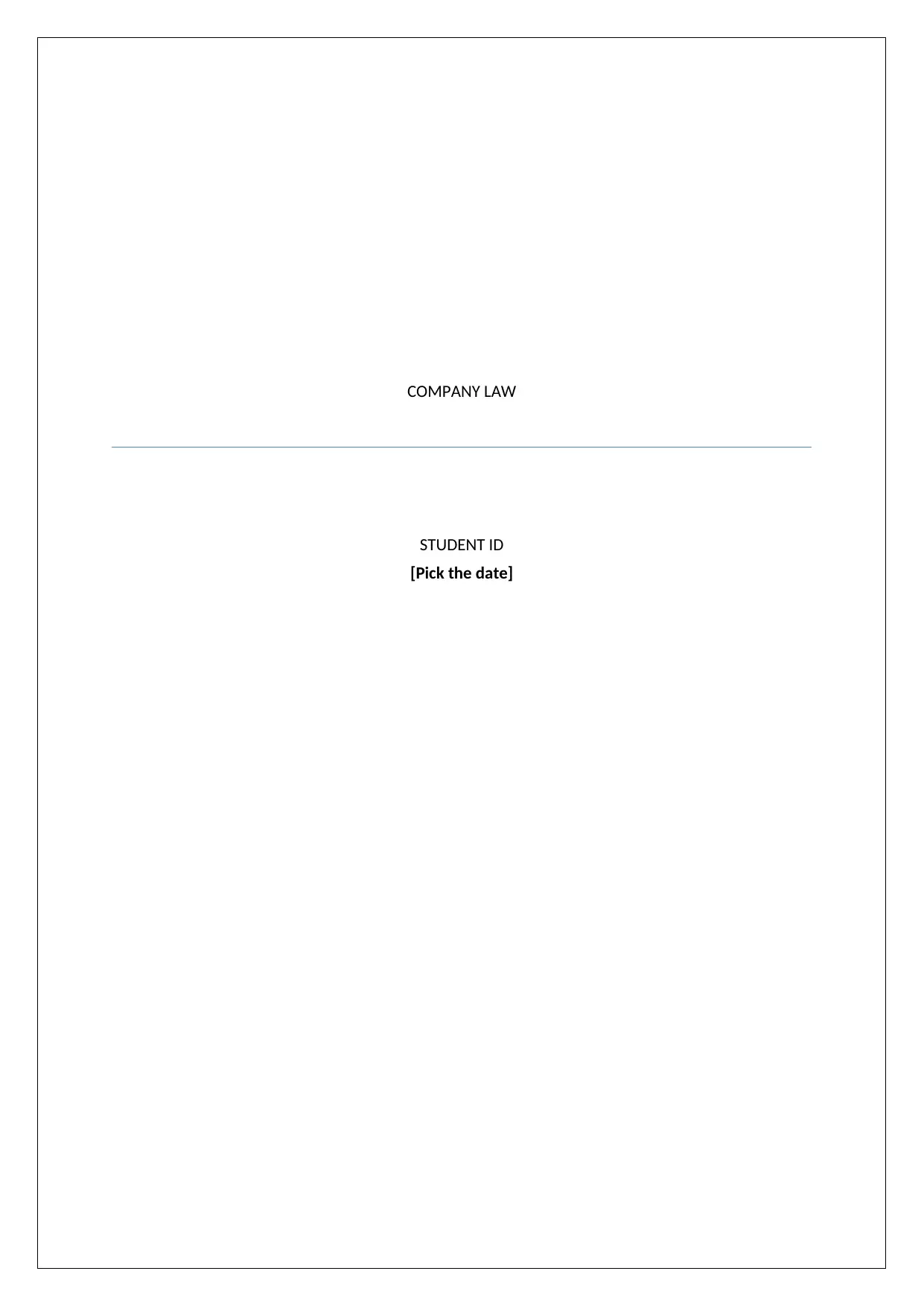
COMPANY LAW
STUDENT ID
[Pick the date]
STUDENT ID
[Pick the date]
Paraphrase This Document
Need a fresh take? Get an instant paraphrase of this document with our AI Paraphraser
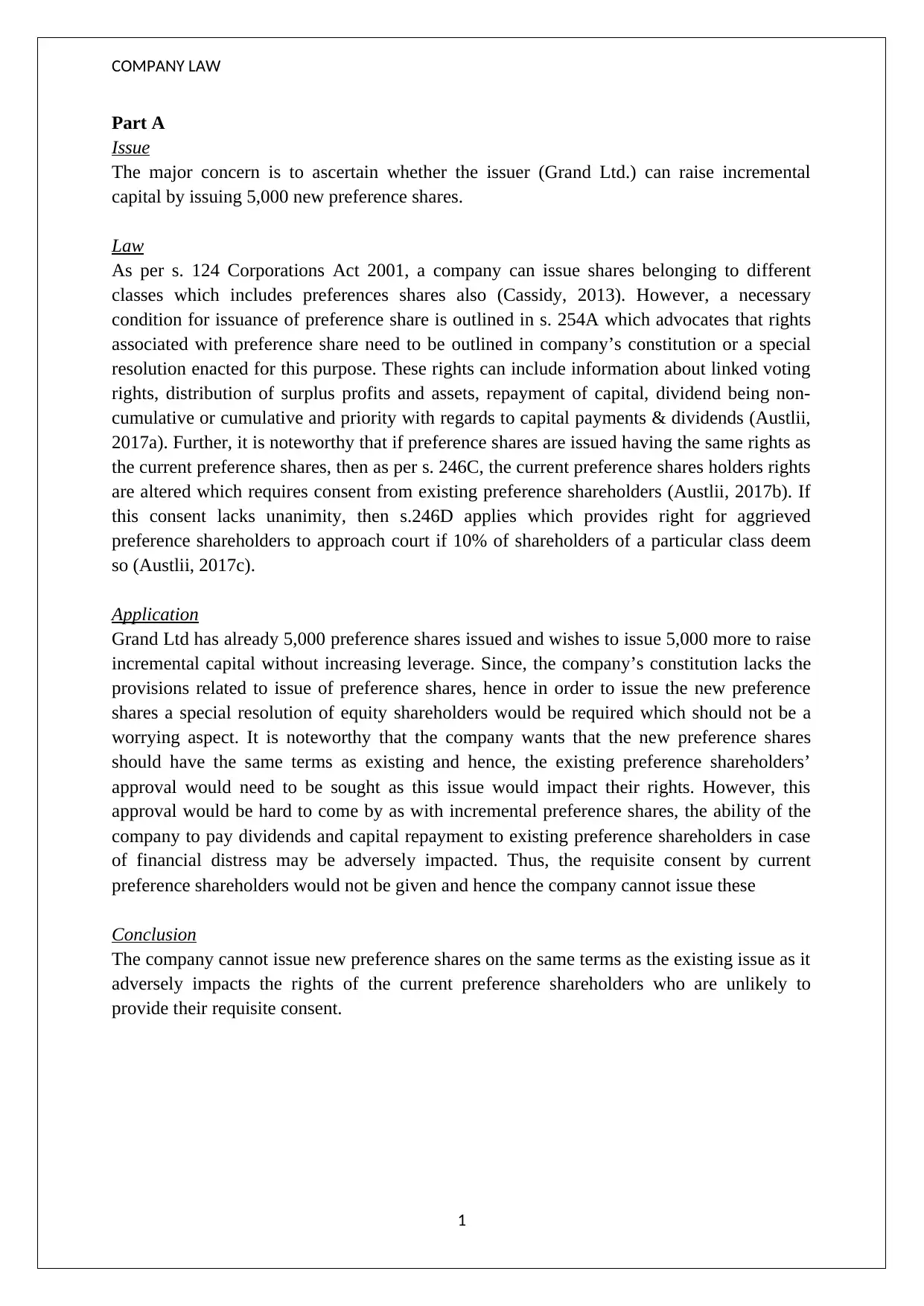
COMPANY LAW
Part A
Issue
The major concern is to ascertain whether the issuer (Grand Ltd.) can raise incremental
capital by issuing 5,000 new preference shares.
Law
As per s. 124 Corporations Act 2001, a company can issue shares belonging to different
classes which includes preferences shares also (Cassidy, 2013). However, a necessary
condition for issuance of preference share is outlined in s. 254A which advocates that rights
associated with preference share need to be outlined in company’s constitution or a special
resolution enacted for this purpose. These rights can include information about linked voting
rights, distribution of surplus profits and assets, repayment of capital, dividend being non-
cumulative or cumulative and priority with regards to capital payments & dividends (Austlii,
2017a). Further, it is noteworthy that if preference shares are issued having the same rights as
the current preference shares, then as per s. 246C, the current preference shares holders rights
are altered which requires consent from existing preference shareholders (Austlii, 2017b). If
this consent lacks unanimity, then s.246D applies which provides right for aggrieved
preference shareholders to approach court if 10% of shareholders of a particular class deem
so (Austlii, 2017c).
Application
Grand Ltd has already 5,000 preference shares issued and wishes to issue 5,000 more to raise
incremental capital without increasing leverage. Since, the company’s constitution lacks the
provisions related to issue of preference shares, hence in order to issue the new preference
shares a special resolution of equity shareholders would be required which should not be a
worrying aspect. It is noteworthy that the company wants that the new preference shares
should have the same terms as existing and hence, the existing preference shareholders’
approval would need to be sought as this issue would impact their rights. However, this
approval would be hard to come by as with incremental preference shares, the ability of the
company to pay dividends and capital repayment to existing preference shareholders in case
of financial distress may be adversely impacted. Thus, the requisite consent by current
preference shareholders would not be given and hence the company cannot issue these
Conclusion
The company cannot issue new preference shares on the same terms as the existing issue as it
adversely impacts the rights of the current preference shareholders who are unlikely to
provide their requisite consent.
1
Part A
Issue
The major concern is to ascertain whether the issuer (Grand Ltd.) can raise incremental
capital by issuing 5,000 new preference shares.
Law
As per s. 124 Corporations Act 2001, a company can issue shares belonging to different
classes which includes preferences shares also (Cassidy, 2013). However, a necessary
condition for issuance of preference share is outlined in s. 254A which advocates that rights
associated with preference share need to be outlined in company’s constitution or a special
resolution enacted for this purpose. These rights can include information about linked voting
rights, distribution of surplus profits and assets, repayment of capital, dividend being non-
cumulative or cumulative and priority with regards to capital payments & dividends (Austlii,
2017a). Further, it is noteworthy that if preference shares are issued having the same rights as
the current preference shares, then as per s. 246C, the current preference shares holders rights
are altered which requires consent from existing preference shareholders (Austlii, 2017b). If
this consent lacks unanimity, then s.246D applies which provides right for aggrieved
preference shareholders to approach court if 10% of shareholders of a particular class deem
so (Austlii, 2017c).
Application
Grand Ltd has already 5,000 preference shares issued and wishes to issue 5,000 more to raise
incremental capital without increasing leverage. Since, the company’s constitution lacks the
provisions related to issue of preference shares, hence in order to issue the new preference
shares a special resolution of equity shareholders would be required which should not be a
worrying aspect. It is noteworthy that the company wants that the new preference shares
should have the same terms as existing and hence, the existing preference shareholders’
approval would need to be sought as this issue would impact their rights. However, this
approval would be hard to come by as with incremental preference shares, the ability of the
company to pay dividends and capital repayment to existing preference shareholders in case
of financial distress may be adversely impacted. Thus, the requisite consent by current
preference shareholders would not be given and hence the company cannot issue these
Conclusion
The company cannot issue new preference shares on the same terms as the existing issue as it
adversely impacts the rights of the current preference shareholders who are unlikely to
provide their requisite consent.
1
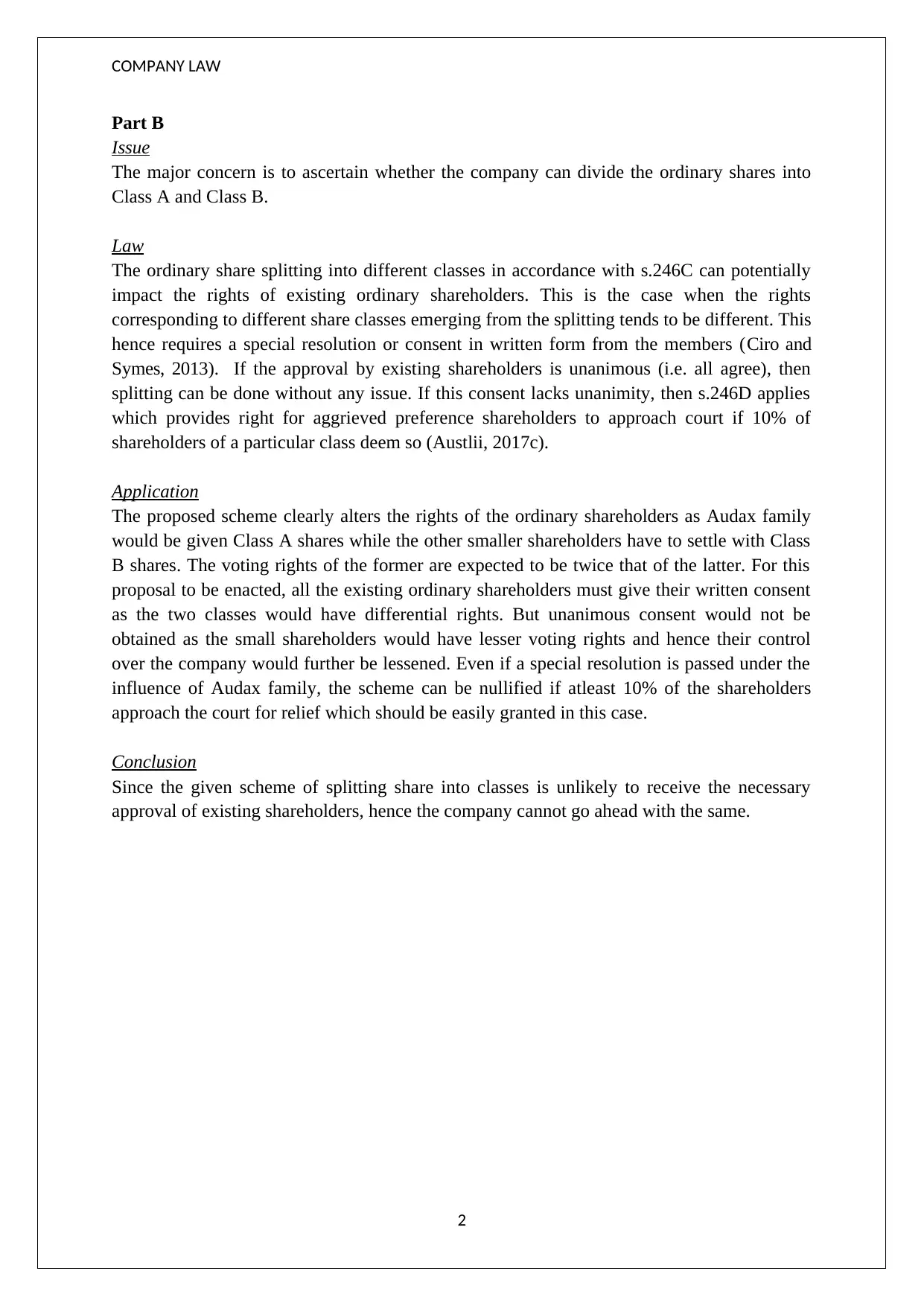
COMPANY LAW
Part B
Issue
The major concern is to ascertain whether the company can divide the ordinary shares into
Class A and Class B.
Law
The ordinary share splitting into different classes in accordance with s.246C can potentially
impact the rights of existing ordinary shareholders. This is the case when the rights
corresponding to different share classes emerging from the splitting tends to be different. This
hence requires a special resolution or consent in written form from the members (Ciro and
Symes, 2013). If the approval by existing shareholders is unanimous (i.e. all agree), then
splitting can be done without any issue. If this consent lacks unanimity, then s.246D applies
which provides right for aggrieved preference shareholders to approach court if 10% of
shareholders of a particular class deem so (Austlii, 2017c).
Application
The proposed scheme clearly alters the rights of the ordinary shareholders as Audax family
would be given Class A shares while the other smaller shareholders have to settle with Class
B shares. The voting rights of the former are expected to be twice that of the latter. For this
proposal to be enacted, all the existing ordinary shareholders must give their written consent
as the two classes would have differential rights. But unanimous consent would not be
obtained as the small shareholders would have lesser voting rights and hence their control
over the company would further be lessened. Even if a special resolution is passed under the
influence of Audax family, the scheme can be nullified if atleast 10% of the shareholders
approach the court for relief which should be easily granted in this case.
Conclusion
Since the given scheme of splitting share into classes is unlikely to receive the necessary
approval of existing shareholders, hence the company cannot go ahead with the same.
2
Part B
Issue
The major concern is to ascertain whether the company can divide the ordinary shares into
Class A and Class B.
Law
The ordinary share splitting into different classes in accordance with s.246C can potentially
impact the rights of existing ordinary shareholders. This is the case when the rights
corresponding to different share classes emerging from the splitting tends to be different. This
hence requires a special resolution or consent in written form from the members (Ciro and
Symes, 2013). If the approval by existing shareholders is unanimous (i.e. all agree), then
splitting can be done without any issue. If this consent lacks unanimity, then s.246D applies
which provides right for aggrieved preference shareholders to approach court if 10% of
shareholders of a particular class deem so (Austlii, 2017c).
Application
The proposed scheme clearly alters the rights of the ordinary shareholders as Audax family
would be given Class A shares while the other smaller shareholders have to settle with Class
B shares. The voting rights of the former are expected to be twice that of the latter. For this
proposal to be enacted, all the existing ordinary shareholders must give their written consent
as the two classes would have differential rights. But unanimous consent would not be
obtained as the small shareholders would have lesser voting rights and hence their control
over the company would further be lessened. Even if a special resolution is passed under the
influence of Audax family, the scheme can be nullified if atleast 10% of the shareholders
approach the court for relief which should be easily granted in this case.
Conclusion
Since the given scheme of splitting share into classes is unlikely to receive the necessary
approval of existing shareholders, hence the company cannot go ahead with the same.
2
⊘ This is a preview!⊘
Do you want full access?
Subscribe today to unlock all pages.

Trusted by 1+ million students worldwide
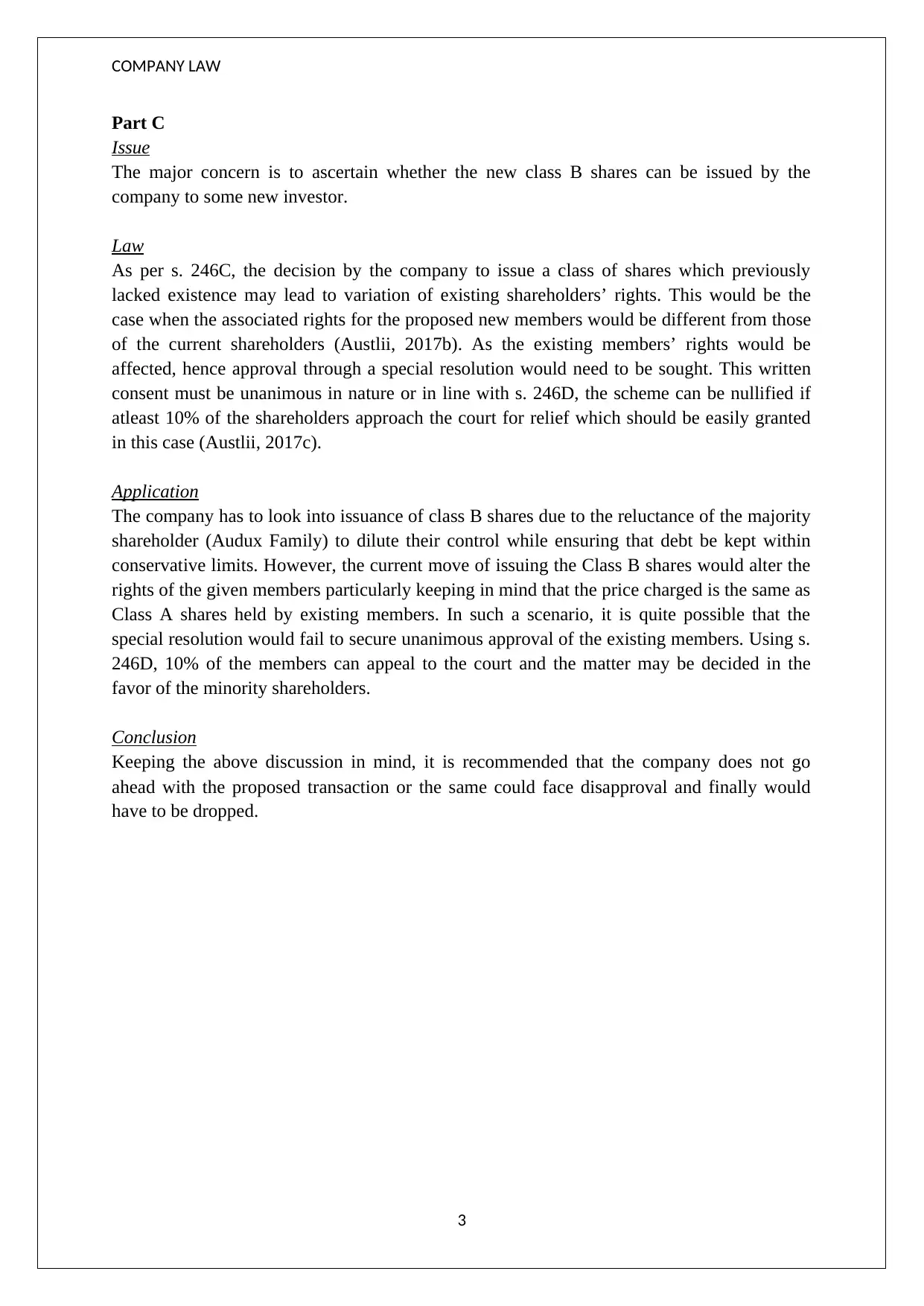
COMPANY LAW
Part C
Issue
The major concern is to ascertain whether the new class B shares can be issued by the
company to some new investor.
Law
As per s. 246C, the decision by the company to issue a class of shares which previously
lacked existence may lead to variation of existing shareholders’ rights. This would be the
case when the associated rights for the proposed new members would be different from those
of the current shareholders (Austlii, 2017b). As the existing members’ rights would be
affected, hence approval through a special resolution would need to be sought. This written
consent must be unanimous in nature or in line with s. 246D, the scheme can be nullified if
atleast 10% of the shareholders approach the court for relief which should be easily granted
in this case (Austlii, 2017c).
Application
The company has to look into issuance of class B shares due to the reluctance of the majority
shareholder (Audux Family) to dilute their control while ensuring that debt be kept within
conservative limits. However, the current move of issuing the Class B shares would alter the
rights of the given members particularly keeping in mind that the price charged is the same as
Class A shares held by existing members. In such a scenario, it is quite possible that the
special resolution would fail to secure unanimous approval of the existing members. Using s.
246D, 10% of the members can appeal to the court and the matter may be decided in the
favor of the minority shareholders.
Conclusion
Keeping the above discussion in mind, it is recommended that the company does not go
ahead with the proposed transaction or the same could face disapproval and finally would
have to be dropped.
3
Part C
Issue
The major concern is to ascertain whether the new class B shares can be issued by the
company to some new investor.
Law
As per s. 246C, the decision by the company to issue a class of shares which previously
lacked existence may lead to variation of existing shareholders’ rights. This would be the
case when the associated rights for the proposed new members would be different from those
of the current shareholders (Austlii, 2017b). As the existing members’ rights would be
affected, hence approval through a special resolution would need to be sought. This written
consent must be unanimous in nature or in line with s. 246D, the scheme can be nullified if
atleast 10% of the shareholders approach the court for relief which should be easily granted
in this case (Austlii, 2017c).
Application
The company has to look into issuance of class B shares due to the reluctance of the majority
shareholder (Audux Family) to dilute their control while ensuring that debt be kept within
conservative limits. However, the current move of issuing the Class B shares would alter the
rights of the given members particularly keeping in mind that the price charged is the same as
Class A shares held by existing members. In such a scenario, it is quite possible that the
special resolution would fail to secure unanimous approval of the existing members. Using s.
246D, 10% of the members can appeal to the court and the matter may be decided in the
favor of the minority shareholders.
Conclusion
Keeping the above discussion in mind, it is recommended that the company does not go
ahead with the proposed transaction or the same could face disapproval and finally would
have to be dropped.
3
Paraphrase This Document
Need a fresh take? Get an instant paraphrase of this document with our AI Paraphraser
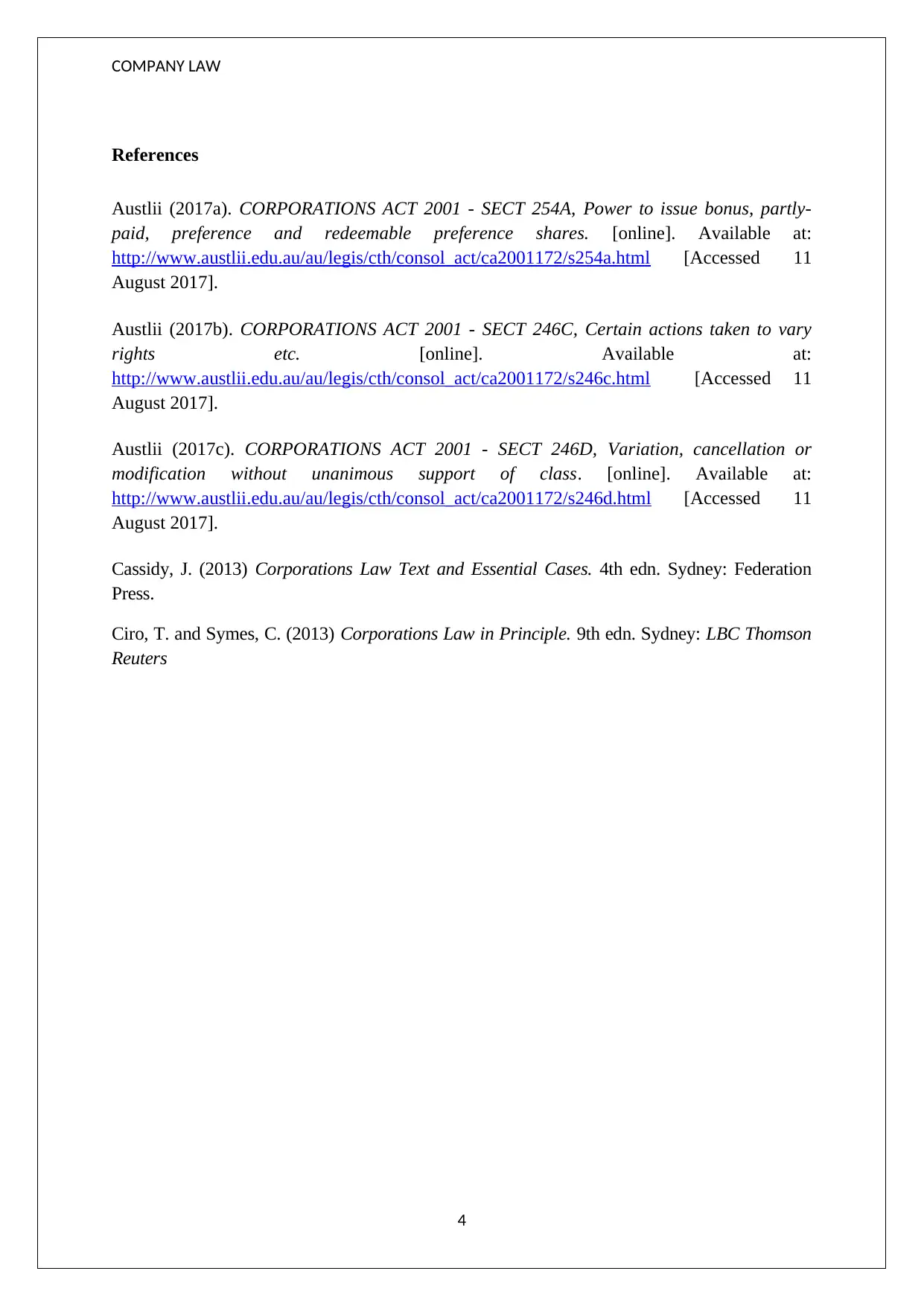
COMPANY LAW
References
Austlii (2017a). CORPORATIONS ACT 2001 - SECT 254A, Power to issue bonus, partly-
paid, preference and redeemable preference shares. [online]. Available at:
http://www.austlii.edu.au/au/legis/cth/consol_act/ca2001172/s254a.html [Accessed 11
August 2017].
Austlii (2017b). CORPORATIONS ACT 2001 - SECT 246C, Certain actions taken to vary
rights etc. [online]. Available at:
http://www.austlii.edu.au/au/legis/cth/consol_act/ca2001172/s246c.html [Accessed 11
August 2017].
Austlii (2017c). CORPORATIONS ACT 2001 - SECT 246D, Variation, cancellation or
modification without unanimous support of class. [online]. Available at:
http://www.austlii.edu.au/au/legis/cth/consol_act/ca2001172/s246d.html [Accessed 11
August 2017].
Cassidy, J. (2013) Corporations Law Text and Essential Cases. 4th edn. Sydney: Federation
Press.
Ciro, T. and Symes, C. (2013) Corporations Law in Principle. 9th edn. Sydney: LBC Thomson
Reuters
4
References
Austlii (2017a). CORPORATIONS ACT 2001 - SECT 254A, Power to issue bonus, partly-
paid, preference and redeemable preference shares. [online]. Available at:
http://www.austlii.edu.au/au/legis/cth/consol_act/ca2001172/s254a.html [Accessed 11
August 2017].
Austlii (2017b). CORPORATIONS ACT 2001 - SECT 246C, Certain actions taken to vary
rights etc. [online]. Available at:
http://www.austlii.edu.au/au/legis/cth/consol_act/ca2001172/s246c.html [Accessed 11
August 2017].
Austlii (2017c). CORPORATIONS ACT 2001 - SECT 246D, Variation, cancellation or
modification without unanimous support of class. [online]. Available at:
http://www.austlii.edu.au/au/legis/cth/consol_act/ca2001172/s246d.html [Accessed 11
August 2017].
Cassidy, J. (2013) Corporations Law Text and Essential Cases. 4th edn. Sydney: Federation
Press.
Ciro, T. and Symes, C. (2013) Corporations Law in Principle. 9th edn. Sydney: LBC Thomson
Reuters
4
1 out of 5
Related Documents
Your All-in-One AI-Powered Toolkit for Academic Success.
+13062052269
info@desklib.com
Available 24*7 on WhatsApp / Email
![[object Object]](/_next/static/media/star-bottom.7253800d.svg)
Unlock your academic potential
Copyright © 2020–2026 A2Z Services. All Rights Reserved. Developed and managed by ZUCOL.




